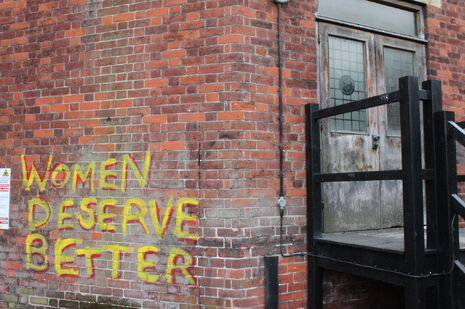Cynicism has no place in radical activism
If you want something done, do it. Don’t sit around complaining, says Chris Waugh

There’s a quote from socialist author and journalist Paul Foot which comes to mind whenever I think about campaigns. Foot writes (and I paraphrase): “It is impossible for a radical to be a cynic. A sceptic, perhaps, but a cynic, no.” What Foot seems to be saying is it’s normal for radicals of all breeds to be pessimistic. Who can blame them? We’re trying to change an unfair world and getting abuse for it, but cynicism would suggest we know before we’ve even set up the Facebook event for that first meeting (inevitably in the Chetwynd Room in Kings), that the project is a failure and we might as well all be playing Candy Crush, rather than trying to sort out absurd archaism that characterises Cambridge.
I bring up Foot’s quotation because one of the most common arguments against student radicalism goes as follows: What’s the point? We’re all only here for three years plus, and we’re part of an educational institution which looks at a glacier and says to itself “Ooh, steady on, mate, you’re going a bit quick”, so what real, palpable impact can we have? There is a sad element of truth in this – student protest groups tend to come and go. I’ve been at Cambridge since 2009, and in my time here I’ve seen great, vibrant radical campaigns spring up, cause a stir and then fall apart. I’ve been involved in several – inevitably, the driving political force behind these campaigns graduates and then it all falls apart. Also, let’s be blunt, political campaigning is exhausting. I fluctuate in my political involvement, mainly because I’m a disabled man and the last time I got too political, some fascists tried to burn my house down (true story).
David Graeber makes the point that all activists go through periods of “semi-retirement.” Most do, eventually return to the political fold, but in a context like Cambridge, where campaigns are often driven by a handful of key individuals, a few people taking an understandable step back can cause the whole thing to grind to a halt. A good example was the End Week 5 Blues campaign, an initiative set up to combat poor mental health provisions and campaign for a reading week. I went to several meetings, and it was deeply ironic (though completely understandable) that our campaign to end mental health discrimination lost momentum because everyone got depressed, myself included.
But is cynicism then the right perspective for these groups? The cynical argument comes before the more annoying argument, which is that Cambridge is totally perfect and people who want to change it are ungrateful/trying to avoid work/Maoist infiltrators (seriously, I’ve been accused of the latter, but I heard it as Meowist, so spent the rest of the day wondering if cats were out to get us). Everyone will have their own unique experience of this place, but that doesn’t erase structural flaws, institutional problems and inequalities. You might love Cambridge from the bottom of your heart, you might have King’s Chapel tattooed over your heart, but you can’t honestly say that it’s perfect. It’s an old institution, and like many old institutions, it can lag behind society and what is reasonable.
What is good about campaigns – be it CDE, Cambridge Speaks Its Mind, Whose University – is that they start a conversation, and that in itself is a radical act. And sometimes people listen. The Women’s Campaign, for instance, gets a lot of flack, but it has had a palpable impact on Cambridge students’ life. Does your college have a decent sexual harassment policy? That was WomCam. Have you walked over Parker’s Piece and felt safer because of the lights? That was WomCam. Welfare-based campaigns like CSIM and WU have caused students to question if their colleges are supporting vulnerable students; Cambridge Defend Education has done exceptional work exposing the real, palpable impact of cuts on university life. The list goes on. It’s a hard drag being an activist, but far too often people will claim that campaigns fail because, I don’t know, the outcome of that last meeting wasn’t full intersectional communism and free fairy cakes for all. Show me one political campaign that achieved its aims overnight. Show me one political campaign that didn’t involve long hours of hard work and months, even years, of commitment. In fact, show me anything in life that doesn’t require time and energy – the fact that your goals may not be achieved immediately is not an argument against starting, or trying.
So yes, I’m pessimistic, I’m sceptical if change can be achieved. But am I a cynic? No. And neither should you be. If you care, go out, get involved, do your bit. And look after yourself. What you do now will benefit future generations. And that, ultimately, is what matters.
 News / Fitz students face ‘massive invasion of privacy’ over messy rooms23 April 2024
News / Fitz students face ‘massive invasion of privacy’ over messy rooms23 April 2024 News / Cambridge University disables comments following Passover post backlash 24 April 2024
News / Cambridge University disables comments following Passover post backlash 24 April 2024 Comment / Gown vs town? Local investment plans must remember Cambridge is not just a university24 April 2024
Comment / Gown vs town? Local investment plans must remember Cambridge is not just a university24 April 2024 Comment / Does Lucy Cavendish need a billionaire bailout?22 April 2024
Comment / Does Lucy Cavendish need a billionaire bailout?22 April 2024 Interviews / Gender Agenda on building feminist solidarity in Cambridge24 April 2024
Interviews / Gender Agenda on building feminist solidarity in Cambridge24 April 2024





